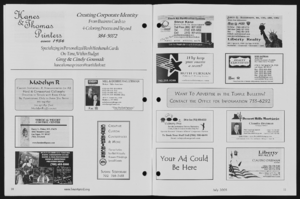Search the Special Collections and Archives Portal
Search Results
Alex Shoofey Papers
Identifier
Abstract
The Alex Shoofey Papers are comprised of records spanning 1967 to 1972 that primarily pertain to financial operations and policies for the International Hotel and Casino-Las Vegas Hilton and the Flamingo Hotel in Las Vegas, Nevada. The collection includes daily profit and loss reports, interdepartmental correspondence, staffing and operational policies and procedures, production reports, and Shoofey's personal correspondence. Collection materials are representative of business and financial records from Shoofey's tenure as president of both the International and Flamingo hotels and casinos.
Archival Collection
Gilbert Schwartz Papers
Identifier
Abstract
The collection documents Gilbert Shwartz's early involvement with the Clark County Sheriff's Mounted Posse and the Elks Club in the early 1960s as well as the growth of his real estate company, Sahara Realty, from 1963 to 2008. The collection includes photographs and programs of the Clark County Sheriff's Mounted Posse Rodeo and programs for the Elks Club Helldorado Days Rodeo from the early 1960s. The collection also includes photographs of Schwartz and his home, slides of Sahara Realty/Realtors advertising around Las Vegas, and autographed team photographs of the Central Little League teams sponsored by Sahara Realty. Also included is a program for the National Association of Real Estate Brokers annual conference held in Las Vegas in 1974.
Archival Collection
Arthur and Joe Lyon Papers
Identifier
Abstract
The Arthur and Joe Lyon Papers (1930-1935, 1985, 2020) document the first transnational automobile trip taken from North America to Central America in 1930 by Arthur and Joe Lyon, two brothers from McDermitt, Nevada. The materials in this collection include Arthur and Joe Lyon's passports with stamps from their trip and their travel scrapbook. Materials also include the brothers' handwritten notes about their trip from the 1930s and original typescript for
Archival Collection
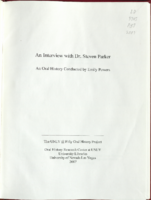
Transcript of interview with Dr. Steven Parker by Emily Powers, December 19, 2006
Date
Archival Collection
Description
Text
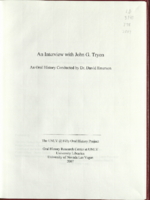
Transcript of interview with John G. Tryon by Dr. David Emerson, February 21, 2006
Date
Archival Collection
Description
Text
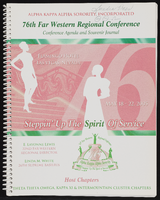
Alpha Kappa Alpha Sorority 76th Far West Regional conference program (MGM Grand Hotel)
Date
Archival Collection
Description
From the Alpha Kappa Alpha Sorority, Incorporated, Theta Theta Omega Chapter Records (MS-01014) -- Ivy Leaf magazines and event souvenir programs file.
Text
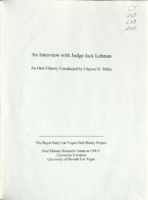
Transcript of interview with Jack Lehman by by Claytee White, October 17, 2007
Date
Archival Collection
Description
Judge Jack Lehman is living the life we should all strive for - a wonderful family, a work ethic that has allowed him to serve others while enjoying a magnificent life and above all a great love affair with his beautiful artistic wife, Lou Lou. From Chemnitz, Germany, at the beginning of the Nazi reign to a prominent citizen of Las Vegas, Lehman lives an extraordinary Las Vegas life. Born in Germany in the late 1920s, Jack and his sister were sent to the United States in 1935 and after a series of living situations including a orphanage in New York, they were adopted by the Lehman family in Lake Arrowhead, California. As a young boy, he wanted to become a lawyer. After a degree from Berkeley, two tours of military duty, a stint in radio broadcasting, and serving as the Director of the Nevada Department of Economic Development, he entered law school at USC. Lehman's career in the legal field began at the largest law firm in the city - Lionel Sawyer and Collins - and then into private practice and on to the bench as a District Court judge appointed by Governor Richard Bryan. In February 2008, he was honored by judges and friends statewide as the founder of Nevada's Adult Criminal Drug Court Program commonly known as "drug court." Washoe County District Judge Peter Breen said it best, "The state is a much better place because of Jack. All those people came back from the abyss of addiction because of Jack."
Text

Transcript of interview with Howard E. Hollingsworth by Joseph Concannen, February 23, 1979
Date
Archival Collection
Description
On February 23, 1979, collector Joseph Concannen interviewed educator, Howard E. Hollingsworth (born October 3rd, 1927 in Preston, Idaho) in J. D. Smith Junior High School in Las Vegas, Nevada. This interview covers the history of Nevada. Mr. Hollingsworth also discusses the Mormon Fort, ranches, and the railroad.
Text

Interview with Benjamin Clinton Diven, March 10, 2004
Date
Archival Collection
Description
Text

